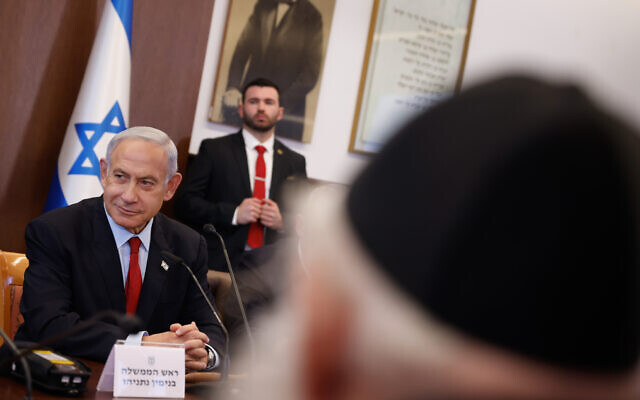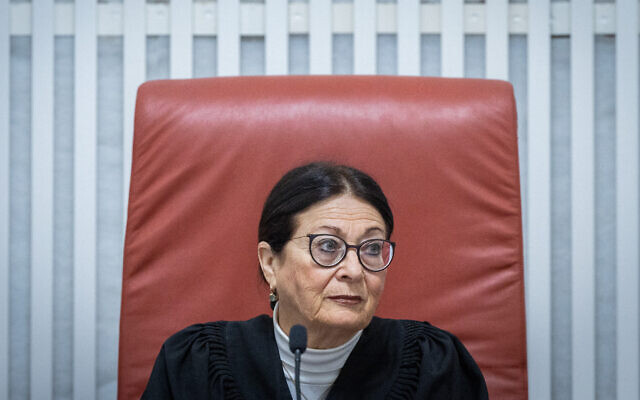Prime Minister Benjamin Netanyahu removed his senior ally Aryeh Deri from government on Sunday, in a move expected to create political uncertainty despite being mandated by the High Court of Justice and defended by the attorney general.
Netanyahu said he was “forced with a heavy heart” to comply with Wednesday’s court Rule – which cited Deri’s multiple convictions and the recent apparent deception of a lower court – and the termination of Deri’s dual appointment as Minister of Interior and Health. The dismissal will go into effect on Tuesday. Deri’s Shas party has pushed Netanyahu to find a way for him back into government, and the prime minister has vowed to find “in any legal way Where you can continue to contribute to the State of Israel.”
In response to his dismissal, Deri said that after the court’s decision “it became clear” to him and Netanyahu that he would leave the government, but would not withdraw from political life. He said, “No judicial decision will prevent me from serving and representing” the 400,000 Shas voters who gave his ultra-Orthodox party 11 Knesset seats in the November elections.
Deri promised to continue leading the Shas party as a Knesset member, chairing his party’s meetings, and attending meetings of the heads of the coalition parties. Indeed, Deri participated in a meeting of coalition leaders that Netanyahu convened shortly after the cabinet meeting in which he was dismissed.
A spokesman for Deri said the Shas chairman would also retain the title of deputy prime minister, which is a largely ceremonial title and carries no formal authority. It is unclear whether it will allow Deri to retain an observer seat at the cabinet table, but the spokesman said it is likely that the government will continue to invite Deri to attend its meetings in an observer capacity.
Briefly, during Sunday’s cabinet session, Netanyahu temporarily left the room and left the meeting, accusing Deri. Earlier this month, Deri briefly replaced Netanyahu when the prime minister had a routine colonoscopy.
In his remarks Sunday, the prime minister slammed the court’s “regrettable decision” to disqualify Deri from a ministerial post, saying it disregards “the will of the people, as evidenced by the great confidence that the public has placed in the elected representatives of my government.” When it was clear to everyone that you would serve in the cabinet as a senior minister.
“I justified that it is important for you to serve the State of Israel as a member of the security cabinet in my government, where you can have influence, given your years of experience as a member of the cabinet in the governments of the late Prime Ministers Yitzhak Shamir and Yitzhak Rabin – a rich experience that contributed to security Israel and its resilience,” Netanyahu continued reading to Deri, seated directly to his right, from a prepared letter.
The prime minister will be hard-pressed to resolve the problems created by Deri’s ouster, just three weeks after he was sworn into a hardline coalition that promised political stability, and just three months after he won Israel’s fifth national election in less than four years.

Aryeh Deri arrives at the weekly cabinet meeting at the Prime Minister’s Office in Jerusalem, January 22, 2023. (Olivier Fitoussi/Flash90)
It is not clear who will replace al-Dari in the interior and health ministries. Normally, when a minister resigns, his portfolios automatically revert to the prime minister for an interim period until a new minister is appointed. But since Netanyahu is facing criminal indictment in connection with a separate corruption investigation, the law has prevented him from holding any cabinet seat without the premiership.
As unsourced reports circulated about the various possible external candidates and interim Shas party leaders appointed to Deri, opposition leader Yair Lapid called on Netanyahu to set an immediate date to fill the vacancies.
“What we are seeing is not a government, it is a circus,” Lapid said in a statement shortly after the cabinet meeting. “Netanyahu is weak, but he needs to appoint a full-time health minister and interior minister today.
Deri was charged with overseeing two of Israel’s most powerful and well-funded ministries despite his financial crimes. Although Netanyahu made no mention of Deri’s imminent ouster at the start of Sunday’s meeting, he devoted the bulk of his remarks to “congratulating Deputy Prime Minister and Health Minister Aryeh Deri” on expanding health services covered by the country’s national health insurance.

Prime Minister Benjamin Netanyahu leads the weekly cabinet meeting at the Prime Minister’s Office in Jerusalem, January 22, 2023. (Olivier Fitoussi/Flash90)
Prime Minister Deri sacked him four days after the Supreme Court issued its explosive ruling that the decision to appoint the Shas leader as interior and health minister was “unreasonable in the extreme” in light of Deri’s criminal convictions, most recently in January 2022.
Deri struck a plea deal at the time with the Jerusalem Magistrate’s Court, which allowed him to resign from the Knesset before his sentencing and thus avoid a hearing on whether his conviction for tax fraud involved moral wrongdoing — a designation that would have prevented him from holding public office. for seven years. years.
The court believed at the time that Deri was retiring from public life. However, he continued to lead the Shas party from outside the Knesset and was soon reinstated as an MP in the November 1 elections. Deri then demanded that Netanyahu return to the cabinet table, despite a basic law: The government requires the Central Elections Commission to determine whether his crime involved moral wrongdoing before he can be appointed minister.
The coalition quickly reformed to allow Deri to be sworn in along with the rest of the cabinet on December 29.

Supreme Court Chief Justice Esther Hayut at a hearing on petitions calling for the annulment of Shas party leader Aryeh Deri’s appointment as government minister due to his recent conviction of tax offenses, before the Supreme Court in Jerusalem, on January 5, 2023. / Flash 90)
Deri doubled down on Sunday on his claim that he never gave the court the impression that he was giving up on politics, despite the judge’s opinion. comments From the time that exactly confirms this impression. The Supreme Court relied in its ruling last week in part on the concept of the judiciary Dropp offarguing that Deri could not benefit from a leniency deal based on the assumption that he would leave public life, and then quickly return to public life.
In addition to using the lockdown, the court overturned Deri’s appointment as failing a test of reasonableness, a judicial standard that the Netanyahu government has vowed to overturn amid its push to pass sweeping changes to the system of checks and balances.
“I can tell my friends in government and the public that it was clear to the prosecution and that it was clear to the former attorney general, Dr. Avichai Mandelblit, that I did not intend, had no intention or commitment to leave political life. Things were clear and on the table,” Deri said during the cabinet meeting. From the beginning of the discussion to the end.
The Netanyahu government’s push to reshape the judiciary would also include moving the appointment of judges to political control, creating a mechanism to protect basic laws from court interference, and re-enacting other laws struck down by the court. His government says it is necessary to rectify the balance of power between the political and judicial branches. But critics, including more than 100,000 Israelis who took to the streets Saturday night to protest the reform plan, say it threatens democratic institutions and endangers civil liberties by giving almost all power to the ruling coalition. .

Coalition party leaders meet with Prime Minister Benjamin Netanyahu in Jerusalem, January 22, 2023 (Courtesy Likud)
After the cabinet meeting, the leaders of the main coalition met with Netanyahu. A Likud spokesperson said the meeting was held “in good spirit” and “warmly”. Religious Zionist leader Bezalel Smotrich attended, despite boycotting a cabinet meeting with two fellow party ministers to protest the government’s decision to bypass his protection of an illegal settlement on Friday.
In addition to the leaders of the coalition factions: Deri, Smotrich and Yitzhak Goldknopf from the United Torah Judaism party, Itamar Ben Gvir from Otzma Yehudit and Avi Maoz from Noam, the head of the Degel HaTorah faction Moshe Gafni and a number of members of Netanyahu’s Likud party also attended the meeting. – Justice Minister Yariv Levin, Education Minister Yoav Kisch and Coalition Minister Ofir Katz.

“Lifelong food lover. Avid beeraholic. Zombie fanatic. Passionate travel practitioner.”
